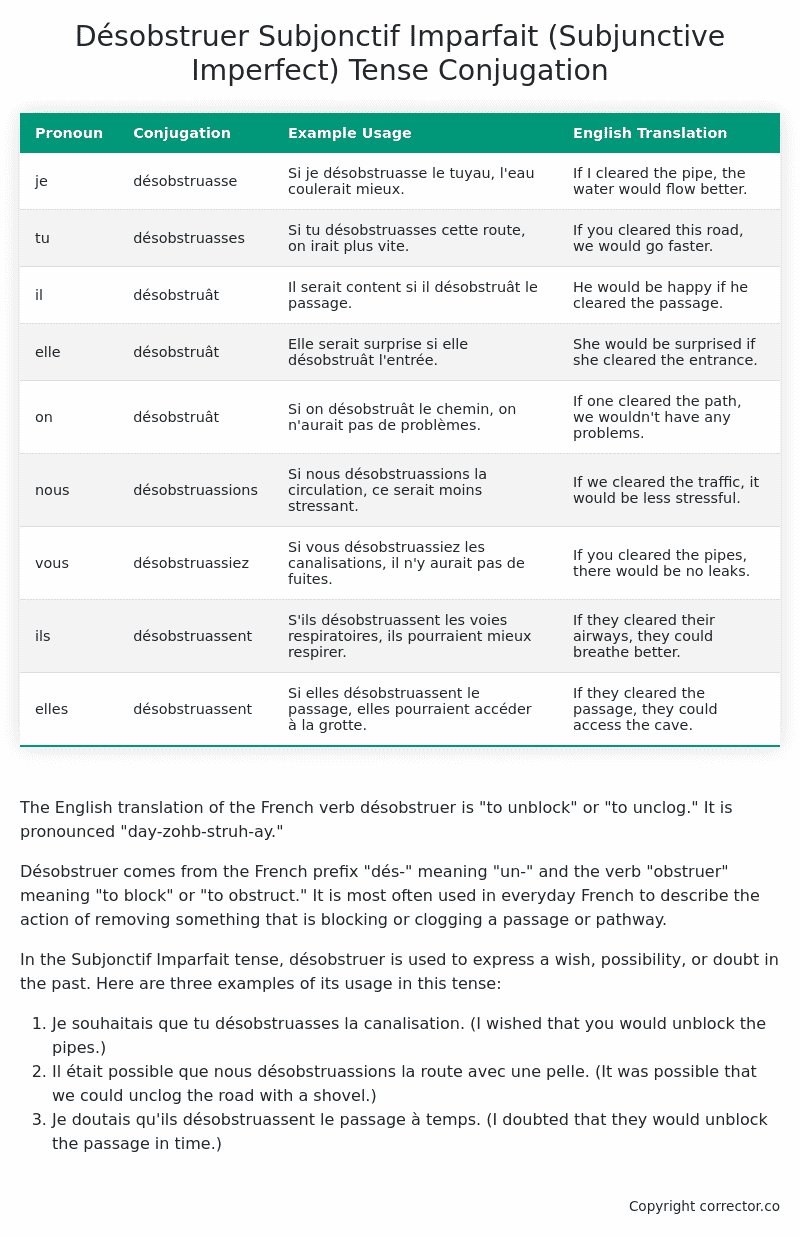Subjonctif Imparfait (Subjunctive Imperfect) Tense Conjugation of the French Verb désobstruer
Introduction to the verb désobstruer
The English translation of the French verb désobstruer is “to unblock” or “to unclog.” It is pronounced “day-zohb-struh-ay.”
Désobstruer comes from the French prefix “dés-” meaning “un-” and the verb “obstruer” meaning “to block” or “to obstruct.” It is most often used in everyday French to describe the action of removing something that is blocking or clogging a passage or pathway.
In the Subjonctif Imparfait tense, désobstruer is used to express a wish, possibility, or doubt in the past. Here are three examples of its usage in this tense:
- Je souhaitais que tu désobstruasses la canalisation. (I wished that you would unblock the pipes.)
- Il était possible que nous désobstruassions la route avec une pelle. (It was possible that we could unclog the road with a shovel.)
- Je doutais qu’ils désobstruassent le passage à temps. (I doubted that they would unblock the passage in time.)
Table of the Subjonctif Imparfait (Subjunctive Imperfect) Tense Conjugation of désobstruer
| Pronoun | Conjugation | Example Usage | English Translation |
|---|---|---|---|
| je | désobstruasse | Si je désobstruasse le tuyau, l’eau coulerait mieux. | If I cleared the pipe, the water would flow better. |
| tu | désobstruasses | Si tu désobstruasses cette route, on irait plus vite. | If you cleared this road, we would go faster. |
| il | désobstruât | Il serait content si il désobstruât le passage. | He would be happy if he cleared the passage. |
| elle | désobstruât | Elle serait surprise si elle désobstruât l’entrée. | She would be surprised if she cleared the entrance. |
| on | désobstruât | Si on désobstruât le chemin, on n’aurait pas de problèmes. | If one cleared the path, we wouldn’t have any problems. |
| nous | désobstruassions | Si nous désobstruassions la circulation, ce serait moins stressant. | If we cleared the traffic, it would be less stressful. |
| vous | désobstruassiez | Si vous désobstruassiez les canalisations, il n’y aurait pas de fuites. | If you cleared the pipes, there would be no leaks. |
| ils | désobstruassent | S’ils désobstruassent les voies respiratoires, ils pourraient mieux respirer. | If they cleared their airways, they could breathe better. |
| elles | désobstruassent | Si elles désobstruassent le passage, elles pourraient accéder à la grotte. | If they cleared the passage, they could access the cave. |
Other Conjugations for Désobstruer.
Le Present (Present Tense) Conjugation of the French Verb désobstruer
Imparfait (Imperfect) Tense Conjugation of the French Verb désobstruer
Passé Simple (Simple Past) Tense Conjugation of the French Verb désobstruer
Passé Composé (Present Perfect) Tense Conjugation of the French Verb désobstruer
Futur Simple (Simple Future) Tense Conjugation of the French Verb désobstruer
Futur Proche (Near Future) Tense Conjugation of the French Verb désobstruer
Plus-que-parfait (Pluperfect) Tense Conjugation of the French Verb désobstruer
Passé Antérieur (Past Anterior) Tense Conjugation of the French Verb désobstruer
Futur Antérieur (Future Anterior) Tense Conjugation of the French Verb désobstruer
Subjonctif Présent (Subjunctive Present) Tense Conjugation of the French Verb désobstruer
Subjonctif Passé (Subjunctive Past) Tense Conjugation of the French Verb désobstruer
Subjonctif Imparfait (Subjunctive Imperfect) Tense Conjugation of the French Verb désobstruer (this article)
Conditionnel Présent (Conditional Present) Tense Conjugation of the French Verb désobstruer
Conditionnel Passé (Conditional Past) Tense Conjugation of the French Verb désobstruer
L’impératif Présent (Imperative Present) Tense Conjugation of the French Verb désobstruer
L’infinitif Présent (Infinitive Present) Tense Conjugation of the French Verb désobstruer
Struggling with French verbs or the language in general? Why not use our free French Grammar Checker – no registration required!
Get a FREE Download Study Sheet of this Conjugation 🔥
Simply right click the image below, click “save image” and get your free reference for the désobstruer Subjonctif Imparfait tense conjugation!

Désobstruer – About the French Subjonctif Imparfait (Subjunctive Imperfect) Tense
Formation
Common Everyday Usage Patterns
Interactions with Other Tenses
Subjonctif Présent
Indicatif Passé Composé
Conditional
Conditional Perfect
Summary
I hope you enjoyed this article on the verb désobstruer. Still in a learning mood? Check out another TOTALLY random French verb conjugation!


